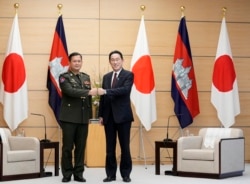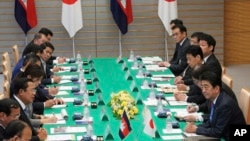Analysts say Cambodian Prime Minister Hun Sen's priority for a planned meeting with his Japanese counterpart, Fumio Kishida, this weekend is finding new sources of funding, and repairing damaged ties with the West, as massive Chinese investments fade and the economic consequences of COVID-19 set in.
Cambodia is threatened by a potential debt trap because of Chinese development loans, according to Carl Shuster, visiting professor at Hawaii Pacific University, which, he said is forcing Hun Sen to reevaluate ties with the West, and Japan is a logical mediator.
“Japan is beginning to assert itself,” he said, adding, “Good feelings towards Japan has, if you will, escalated because of China's behavior.”
“Hun Sen is awakened to the fact that China is not the safe partner that he thought it was,” Schuster said, adding, “I think he believes that if he can play Japanese investment off against China's, then that gives him the capacity to resist China's economic leverage.”
“Hun Sen is looking at it and he's looking at what I call 'the creeping advance of Chinese power' and I don't think he's reacting to right now. I think he's reacting to 10 years from now,” he said, pointing to the benefits of decades of Japanese influence across the region.
Japan is Cambodia's top bilateral donor, accounting for 25% of outside aid over the last 10 years, totaling about $725 million. It has backed the Khmer Rouge tribunal, funded demining, built roads, bridges and ports and provided further assistance throughout the pandemic.
Hun Sen also wants backing for his year as Association of Southeast Asian Nations chair, including his push for negotiations with the junta in Myanmar, and he is sounding out support for his eldest son, Hun Manet, who is expected to replace him as prime minister after elections in July next year.
Schuster said a recent trip by Hun Manet to Japan had laid the groundwork for Kishida's visit and was an early indication of a reshaping in regional politics caused in part by the pandemic and a backlash over Chinese investments.
“He doesn't want to be dominated by China,” he said, referring to Hun Sen.
According to the Cambodian semiofficial news outlet Fresh News, Japanese Foreign Minister Yoshimasa Hayashi praised Hun Manet as a “visionary senior politician.” The Japan Times, however, said he was told Japan wants next year's general election held in a democratic way.
Therein lies the rub.
The ruling Cambodian People's Party won every contested seat in 2018 elections after the main opposition party, the Cambodia National Rescue Party, was barred from competing, upsetting pro-democracy groups that claimed the poll was rigged. Since then, hundreds of dissidents have been charged and jailed.
In response the European Union withdrew some trade benefits, and the United States has since imposed sanctions on Cambodian generals for corrupt practices involving Chinese mega projects.
Washington is also disturbed by Chinese developers who spent billions of dollars transforming Sihanoukville into a notorious a gambling metropolis while constructing a deep-water port.
Their operations have expanded north and 30 kilometers eastward with eight-lane highways encircling an international airport and the Ream Naval Base, which is also being upgraded by China. Nearby hills are being bulldozed and used as landfill for ocean reclamation along the coast.
In return for those investment dollars, Phnom Penh backed Beijing over issues such as the South China Sea and its model for a code of conduct, which has divided ASEAN.
Chinese developments have ground to halt with the pandemic, though. Sihanoukville is littered with closed casinos, half-built skyscrapers and empty apartment blocks, and there are no signs the Chinese will return, which analysts said had left Hun Sen out on a limb.
“He's got a very good rapport with China, but Japan is very keen to go along with the U.S. and other Quad members to sap the influence of China and its Belt and Road Initiative,” Bart Edes, a senior associate at the Center for Strategic and International Studies in Washington, said.
“I think it's just smart politics. I don't see it as a fundamental shift on his part, but why not curry relations with these two leading East Asian powers,” Edes said, referring to Hun Sen.
Two Japanese Maritime Self-Defense Forces ships docked at Ream Naval Base while Hun Sen has said the port at Sihanoukville will not become a Chinese debt trap “like Sri Lanka,” which could not pay for construction of the Hambantota port, and added Japan had brought shares and contributed financially to its $200 million construction.
That will matter to Kishida who will travel to India first and affirm with Prime Minister Narendra Modi the pursuit of a “free and open” Indo-Pacific region as members -- along with Australia and the United States -- of the Quad, an alliance designed to curtail Chinese expansionism.
Kashida will then fly to Cambodia where Edes said, “it's expected that he's going to press Hun Sen on support for the Ukraine's sovereignty and territorial integrity but there'll also take up no doubt the economic and trade issues as well.”
Cambodia, surprisingly given its Cold War ties with Moscow, has already answered that by cosponsoring this month's United Nations resolution condemning Russia's Ukraine invasion.
Analysts said that position is likely to remain and Kishida was expected to back continued negotiations between ASEAN and Myanmar.
Support for Hun Manet is not guaranteed and financial aid to counter waning Chinese interest is not a given, according to Schuster. Schuster said Cambodia has to improve its democratic record at home and decide how far it is prepared to back China abroad.
He added that Cambodia was considering a path already taken by the Philippines and Vietnam. Both, he said, began working more closely with Japan more than 20 years ago to counter China and their relationships now extend beyond economics and into security.
“Now the way the Japanese work is just talking today doesn't mean it's going to happen tomorrow. It typically takes three to five years to get around to the decision,” he said.









